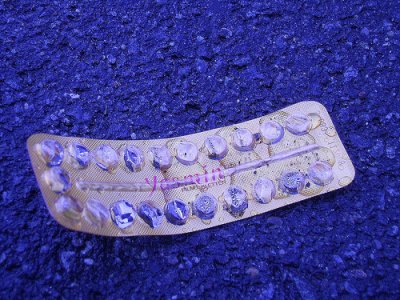What is PMDD? When It’s More Than Just Premenstrual Tension

By: 欠我兩千塊
by Andrea M. Darcy
Do your low moods and anxiety tend to hit every month, then suddenly disappear? Leaving you wondering if you are bipolar, or something similar? And do you suffer worse pre-menstrual tension (PMT) than anyone you know? You might have PMDD.
[Are your out-of-control mood swings ruining your life? Want to talk to someone who can help? Book a therapist today, be talking as soon as tomorrow.]
What is PMDD?
Premenstrual dysphoric disorder (PMDD) isn’t just PMT/PMS.
It is a condition where your hormones heavily affect your moods. In the days leading up to your period you feel totally out of control.
Think of it like PMT on overdrive. If PMT is like a storm passing, PMDD is like a tsunami. And it can certainly feel that way, as it tends to wreck your relationships and life each month.
PMDD vs PMT
PMDD is different than anxiety or depression because it happens at around the same time each month (before your period). When you start menstruating, your symptoms stop and you feel yourself again.
And it’s not just PMT, which just makes you more sensitive and moody but means you can carry on as usual. PMDD really affects your life. You snap out of it to find you’ve ruined a relationship, skipped a day of work, missed something important. You can start to feel like Dr Jekyll and Mr. Hyde, spending half the month cleaning up for the other half when you are out of control.
But my doctor said I just have PMT and depression

By: hnt6581
Post menstrual dysphoric disorder is a recognised diagnosis in America. It is now even found in the DSM-5, the diagnostic manual all mental health practitioners in the USA use.
Unfortunately, here in the United Kingdom, it’s not yet an official diagnosis. Some doctors might not be as willing to take you seriously. It can be helpful to track your moods for several months, so your doctor can see that the moment you begin menstruating you go back to normal.
Even in America, where PMDD is diagnosed, it is still often seen as an endocrine disorder. This is helpful as it recognises it’s a hormone-related condition, but undermines how very serious this condition is when it comes to moods.
At its very worse, cases of PMDD have been found to lead to suicidal thinking and even psychosis, complete with hallucinations. So it is time that doctors take it seriously.
Symptoms of PMDD
Emotional and mental symptoms include:
- mood swings and overreacting
- depression
- anxiety
- listlessness and not wanting to do your usual activities
- wanting to be alone
- bouts of rage and/or crying
- feeling tense and edgy
- picking fights with people
- suicidal thinking.
Physical symptoms include:
- PMT signs like breast tenderness and bloating
- headaches
- changes in appetite
- fatigue
- foggy thinking
- anxiety symptoms – racing heart, sleeplessness, sweating, tension, stomach upset.
Why do I have PMDD?

By: Surija / “Sray”
It’s not fully known what exact causes are. But it’s thought to be a mix of genetics and possibly environment. So you can be born more sensitive to hormones, and perhaps a traumatic past event then triggered your PMDD.
What treatment helps PMDD?
There is controversial advice when it comes to PMDD, and it can be a case of trial and error until you find what works for you.
Talk therapy can help. It can be a great relief to talk to someone who doesn’t judge you and understands. It can particularly help if there is any past trauma in your life that might be making your PMDD worse.
Some doctors will suggest anti-depressant medication, and/or oral or injected contraception. Although it’s not really proven that contraception does help with PMDD, with some women reporting that it made their PMDD worse.
At the very extreme end some women opt to have a hysterectomy.
Self care is important. Track your periods, so you start to get an idea of when your worse days are and can be prepared, such as planning for early nights to get more rest. Many people feel that diet and exercise can be of help, as can avoiding things like alcohol and smoking.
Need to talk to a top therapist in Central London about your PMDD? We connect you with psychotherapists psychologists, and psychiatrists. Not in London or even the UK? Book online therapy now and be talking to someone as soon as tomorrow.
 Andrea M. Darcy is a mental health and wellbeing expert and personal development teacher with training in person-centred counselling and coaching, as well as a popular psychology writer. Follow her on Instagram for useful life tips @am_darcy
Andrea M. Darcy is a mental health and wellbeing expert and personal development teacher with training in person-centred counselling and coaching, as well as a popular psychology writer. Follow her on Instagram for useful life tips @am_darcy





I was wanting to know if I have PMDD, I have severe stress also & on a very high dose of venlaxfaxine
Any more tips or help be greatly appreciated
Hi Golliwog, we can’t diagnose someone over a comment box, especially with such little info. Stress can be connected to so many things, and anti depressants do not cause PMDD from our knowledge. What you need to do is go see someone in person, a professional. If you are worried about the medication you are taking, talk to the doctor who prescribed it, it is their job to answer any and all questions you have and put you at ease. Best, HT
There is help out there. But it’s hard to get!!
It took years before I was taken seriously by a GP. In the end it was a very young doctor who was still in training who took the time to listen. He straight away said my condition was hormone related. I broke into not just tears but I was sopping. It had taken 8 years for someone to take notice that what I was going through was not normal PMT. I did tell him though that if I left with no understanding I would jump in front of a train before Friday as that was when I would next ovulate.
I suffer from PMT with Psychosis or PMDD as some call it. It started 14 years ago when I was 34 years old. It got really bad around 6 years ago. After being seen by the very young doctor I was referred to a gynaecologist at the hospital. I have tried everything. Birth control tablets. Bleed non stop for 6 months. Mini pill, also made me bleed non stop. Next a coil, same result bleed for 6 month. Then monthly injections that stoped my ovaries from working, with hormone replacement therapy. Made no change. Even with the smallest dose of HRT I was off my trolly. Hallucinating at night. Speaking to people who was not there. Night terrors. Just as a “normal” cycle. My GP then decided to give me 4 months of the injections with out hormone replacement. Suddenly I was normal. No sweats, night terrors, mood swings, no hallucinations. I was able to actually sleep undisturbed for 8 hours at night. I have not felt that good since I first had a period. At this time I was 44 years old. I begged the NHS to remove my ovaries but it was refused because I was too young. Instead I was prescribed Venlafaxine. I have been taking it ever since. Started on the smallest dose possible. It stops working after a while and dosage need to be put up. I am now on the highest dose. Side effects: dry like a prune. Need laxatives. Sex can be painful. Feeling sick and nauseous part of most days. Still have excessive sweats and difficulty sleeping. The medication has suppressed my periods hence I don’t have PMDD. GP says they should not suppress them??? Well they have. Only thing is the medication is stopping having its affect. Happens every 6-12 months. But on the highest dosage, can not be increased again. Had a period 2 months ago. First in a year and half. Yep back to hallucinating. I was at work, doing a night shift. Speaking to a person who was not there but I clearly saw him.
6 years ago I had to stop working because of the PMDD. I was like a zombie for 2 weeks out of 4. Starting on ovulation day. My cycle was 28 days every month. Will that happen again? Down hill all the way to craziness. I have not been seen by a gynaecologist since I was out on the Venlafaxine. Got an appointment with the gynaecologist in November. I have decided if the NHS will not pay to have my ovaries removed I will go private. I do not want to be crazy again.
Hi there Snavir, sounds really tough, we are glad you finally found some sort of support. Have you considered if now you are actually dealing with menopause, too? If it’s it’s not that the symptoms from PMDD are no longer being managed by the meds but you actually now are in perimenopause? We aren’t medical doctors, we only offer Menopause counselling, but just as you are exactly describing it. Perimenopause often starts in early forties, it includes night sweats, hot flashes in day, painful sex, vaginal dryness, anxiety, mood swings, changes to appetite, lethargy, and insomnia, as well as very inconsistent periods which can be very light or extremely heavy. It can go on for up to 10 years…..just worth looking into, if that’s the reason for shift in symptoms. By mid fifties at very latest almost all women are completely done with menstruating but many finish far earlier, so by then ovulation won’t be a problem in any case, if that’s any consolation….. Best, HT.